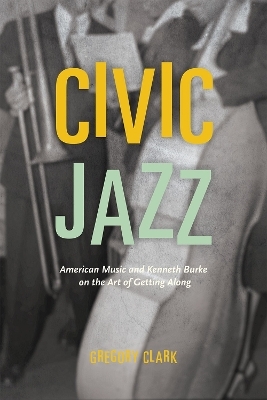
Civic Jazz
American Music and Kenneth Burke on the Art of Getting Along
Seiten
2015
University of Chicago Press (Verlag)
978-0-226-21821-2 (ISBN)
University of Chicago Press (Verlag)
978-0-226-21821-2 (ISBN)
Jazz is born of collaboration, improvisation, and listening. This book weaves an argument about how individuals can preserve and improve civic life in a democratic culture. It will appeal to scholars across disciplines as diverse as political science, performance studies, musicology, and literary criticism.
Jazz is born of collaboration, improvisation, and listening. In much the same way, the American democratic experience is rooted in the interaction of individuals. It is these two seemingly disparate, but ultimately thoroughly American, conceits that Gregory Clark examines in Civic Jazz. Melding Kenneth Burke's concept of rhetorical communication and jazz music's aesthetic encounters with a rigorous sort of democracy, this book weaves an innovative argument about how individuals can preserve and improve civic life in a democratic culture. Jazz music, Clark argues, demonstrates how this aesthetic rhetoric of identification can bind people together through their shared experience in a common project. While such shared experience does not demand agreement-indeed, it often has an air of competition-it does align people in practical effort and purpose. Similarly, Clark shows, Burke considered Americans inhabitants of a persistently rhetorical situation, in which each must choose constantly to identify with some and separate from others.
Thought-provoking and path-breaking, Clark's harmonic mashup of music and rhetoric will appeal to scholars across disciplines as diverse as political science, performance studies, musicology, and literary criticism.
Jazz is born of collaboration, improvisation, and listening. In much the same way, the American democratic experience is rooted in the interaction of individuals. It is these two seemingly disparate, but ultimately thoroughly American, conceits that Gregory Clark examines in Civic Jazz. Melding Kenneth Burke's concept of rhetorical communication and jazz music's aesthetic encounters with a rigorous sort of democracy, this book weaves an innovative argument about how individuals can preserve and improve civic life in a democratic culture. Jazz music, Clark argues, demonstrates how this aesthetic rhetoric of identification can bind people together through their shared experience in a common project. While such shared experience does not demand agreement-indeed, it often has an air of competition-it does align people in practical effort and purpose. Similarly, Clark shows, Burke considered Americans inhabitants of a persistently rhetorical situation, in which each must choose constantly to identify with some and separate from others.
Thought-provoking and path-breaking, Clark's harmonic mashup of music and rhetoric will appeal to scholars across disciplines as diverse as political science, performance studies, musicology, and literary criticism.
Gregory Clark is university professor of English at Brigham Young University. He is the author of Rhetorical Landscapes in America: Variations on a Theme from Kenneth Burke and coeditor of Trained Capacities: John Dewey, Rhetoric, and Democratic Practice and Oratorical Culture in Nineteenth-Century America: Transformations in the Theory and Practice of Public Discourse.
| Erscheint lt. Verlag | 6.3.2015 |
|---|---|
| Sprache | englisch |
| Maße | 16 x 23 mm |
| Gewicht | 340 g |
| Themenwelt | Kunst / Musik / Theater ► Musik ► Jazz / Blues |
| Geisteswissenschaften ► Sprach- / Literaturwissenschaft ► Anglistik / Amerikanistik | |
| Geisteswissenschaften ► Sprach- / Literaturwissenschaft ► Sprachwissenschaft | |
| ISBN-10 | 0-226-21821-X / 022621821X |
| ISBN-13 | 978-0-226-21821-2 / 9780226218212 |
| Zustand | Neuware |
| Haben Sie eine Frage zum Produkt? |
Mehr entdecken
aus dem Bereich
aus dem Bereich
zur politischen Ästhetik des Jazz
Buch | Hardcover (2023)
Phillip Reclam (Verlag)
CHF 49,90
Die Geschichte des Jazz in Deutschland
Buch | Softcover (2021)
Reclam, Philipp (Verlag)
CHF 31,90


